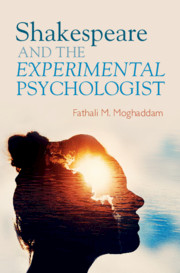Book contents
- Shakespeare and The Experimental Psychologist
- Shakespeare and The Experimental Psychologist
- Copyright page
- Dedication
- Contents
- Preface
- Acknowledgments
- Chapter 1 Introducing Shakespeare’s Psychological Thought Experiments
- Chapter 2 Experimental Research
- Part I Thought Experiments Involving Plays within Plays
- Chapter 3 Hamlet
- Chapter 4 Henry IV, Part I
- Part II Thought Experiments and the Power of Context
- Notes
- References
- Index
Chapter 4 - Henry IV, Part I
from Part I - Thought Experiments Involving Plays within Plays
Published online by Cambridge University Press: 10 June 2021
- Shakespeare and The Experimental Psychologist
- Shakespeare and The Experimental Psychologist
- Copyright page
- Dedication
- Contents
- Preface
- Acknowledgments
- Chapter 1 Introducing Shakespeare’s Psychological Thought Experiments
- Chapter 2 Experimental Research
- Part I Thought Experiments Involving Plays within Plays
- Chapter 3 Hamlet
- Chapter 4 Henry IV, Part I
- Part II Thought Experiments and the Power of Context
- Notes
- References
- Index
Summary
Shakespeare’s play Henry IV, Part I explores the self through different types of thought experiments. Positioning theory is used in this chapter to reveal the details of several thought experiments. Positoning theory was developed to help better explain small-scale social interactions that are regulated by local moral conventions. “Position” is one corner of the positioning triangle, the other two corners of which are “acts,” the social meaning of actions, and “storylines,” a loose cluster of narrative conventions according to which social episodes unfold and positions arise. Central to this play is an an experiment in which Prince Hal plays the role of his father the king, and Falstaff plays Prince Hal. When the prince steps into his father’s shoes, his self-perception and, evetually, his public positioning of himself and others changes. However, he prevents Falstaff from repositioning himself.
Keywords
- Type
- Chapter
- Information
- Shakespeare and the Experimental Psychologist , pp. 49 - 66Publisher: Cambridge University PressPrint publication year: 2021

